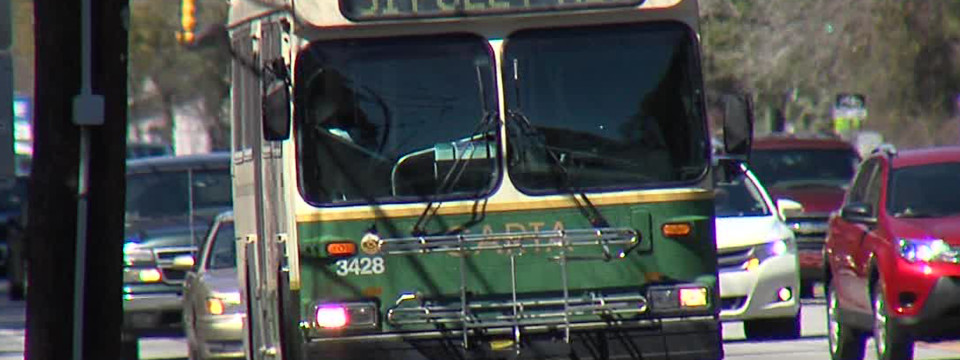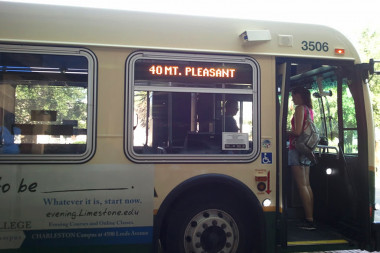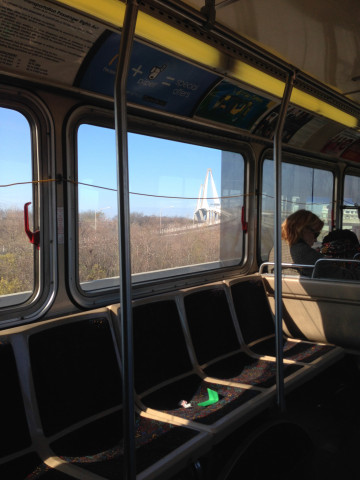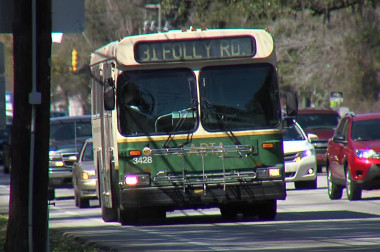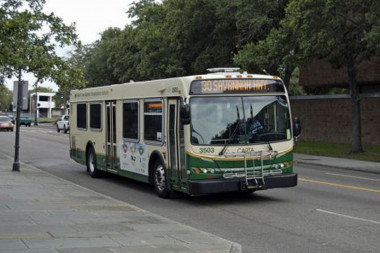S
I recently moved to Mt Pleasant and for the past three months I’ve relied solely on a candied pink and green colored women’s cruiser and the Route 40 to get around. I find CARTA a consummate service at an unbeatable price. A standard flat rate fare is $1.75 with a $0.30 transfer fee allows me to travel across the city, through downtown and all the way to Folly Beach or North Charleston for a mere $2.05.
However, cost alone won’t persuade people to leave their cars at home. Most of us happily pay for convenience, or at least the illusion of it. CARTA describes this as “point-of-pain” which refers to the frustrations of congested traffic, increases in petrol prices and parking difficulties. And most folk need a lot of pain, or a damn good excuse to get out of their vehicles − even when the long lunchtime queue at Chick-fil-A’s drive-thru can easily be circumvented by parking up and walking into the store for counter service.
While sharing public transport with retirees, hospital staff, the odd tourist couple, and young workers dressed in aprons and nametags, my only major criticism is its infrequency and lack of after-hours services. A CARTA spokesperson agrees.
“Increasing frequency of service and offering late-night service are two of the major issues we encounter while trying to grow ridership – and in those areas we find ourselves constrained by limited financial resources.”
Covering North Charleston, Route 11 operates CARTA’s latest daily service which departs downtown at 8.52 pm on Monday through to Saturday. Typically all routes suffer from heavily reduced schedules on Sundays with no service after 7.00 pm.
From Mt Pleasant I can use public transport and arrive downtown to meet friends as late as 9.45 pm on most nights. In contrast, the last service home departs from Mary Street/Meeting Street at 7.45 pm. So like a fairytale, the Ravenel Bridge for me transforms from an aspiring, sunlit imago of connectivity to a nocturnal curse. And on most evenings I feel marooned in Mt Pleasant, barred from the peninsula’s late night hubbub due to costly taxi prices.
Mt Pleasant Mayor, Linda Page agrees that while CARTA performs an invaluable service to people with limited resources there should be much shorter times between trips.
“Public transport is difficult because it often does not recover the cost of the service. Communities need to bridge the gap until the service can support itself. This is not to say that we should fund a public transportation that does not meet standards, but we should strive to have a system that is self-supporting.”
CARTA believes Lowcountry residents should be applauded for recognizing the need for a strong public transport system. A CARTA spokesperson also identified commuters who forgo individual vehicles in favor of public transport as an enormous help to the city.
“CARTA’s ridership continues to grow at a record-breaking pace. Last year our ridership was 4.9 million, or about 40 percent of transit trips in South Carolina. Public support has grown in the past few years, and that can largely be attributed to advancements and improvements in the system, as well as increased visibility and communication with the community.”
So is it strange for an antipodean import to be questioning the lack of late-night transport?
Well, to me it is – especially as Charleston is consistently ranked highest in terms of the most desirable and livable city in numerous international economic and travel guides.
Only recently Charleston City Paper reported the confounding arrest of a young man for public intoxication when he unwittingly asked two undercover cops for a ride because he had drunk too much and rightly decided against drinking. Whether this is indicative of a growing intolerance to Charleston’s late night drinking culture is debatable. But along with the controversial confiscation of bicycles on King Street, and the increased congestion and parking difficulties due to large-scale development and the 1300 people CARTA says are moving to the region each month, more and more residents are turning to public transport.
Most young Charlestonians who I address the lack of late-night transport with shrug indifferently, as if it were an immutable facet of Lowcountry living, while others sound more concerned with their legal rights to evade a DUI.
CARTA appreciates the steady influx of people moving to the region for this reason. A CARTA spokesperson says new arrivals also play a major part in changing public transport’s unfortunate cultural stigma.
“Leveraging residents, who are new to the area and very familiar with using public transit plays an important role in removing old ideas and stigma. They come to the area with a different perspective and attitude and often influence their peers to ride as well.”
As a wanderlust struck author I have always been a strong advocate of public transport for countless benefits communal travel provides. Beyond the pragmatic and environmental advantages, sharing a journey with others reinforces social connectivity, broadens cultural perspective and emboldens our compassion. It shapes an internal vessel of appreciation that we’re all in it together – from the toil of early morning wakeups to end-of-day relief where a tacit nod of understanding or shared greeting become the medicine for everyday vicissitudes and hardships.
CARTA admits the public has shown moderate demand for late-night services, but this is not enough without additional interest and funding.
“Operating the buses is a huge expense, and the fare we collect recovers at most a third of that amount. The one way we can effectively combat this is by partnering with businesses to fund routes. It’s something we do with Boeing, Tanger Oulets and North Charleston on our North Area Shuttle Route.”
Lack of funding has always plagued CARTA since its inception in 1997. A CARTA spokesperson explains the recent recession caused forced cuts in hours and late-night services because of diminished funding. While Mt Pleasant Mayor, Linda Page agrees additional services would be of benefit she says there are more pressing issues facing CARTA.
“The largest issues facing CARTA is an ageing fleet and the cost to build its Intermodal Centre in North Charleston. I don’t believe CARTA can afford to discuss new or expanding service without first budgeting for new equipment to meet these demands.”
However, with its new center and a push to have mixed traffic-HOV lanes, CARTA and its progressive team are not stepping back from the challenges ahead.
“We are looking forward to leading our community in thinking about transit from a more regional perspective and connecting our communities with more efficient and effective services. To get there, we would like to see more partnerships cultivated between CARTA and other agencies and organizations in the area. Growing these relationships will directly impact funding the future of public transit here in Charleston.”







